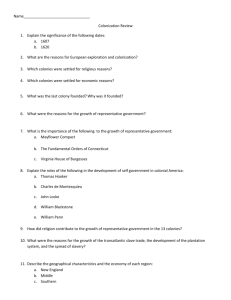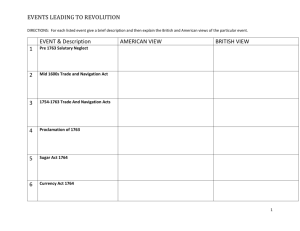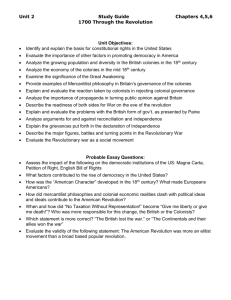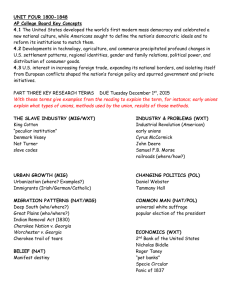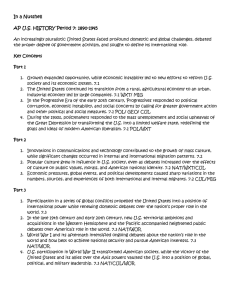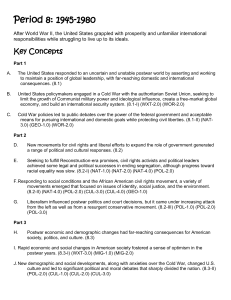AP US HISTORY UNIT 3 AP COLLEGE BOARD KEY CONCEPTS
advertisement
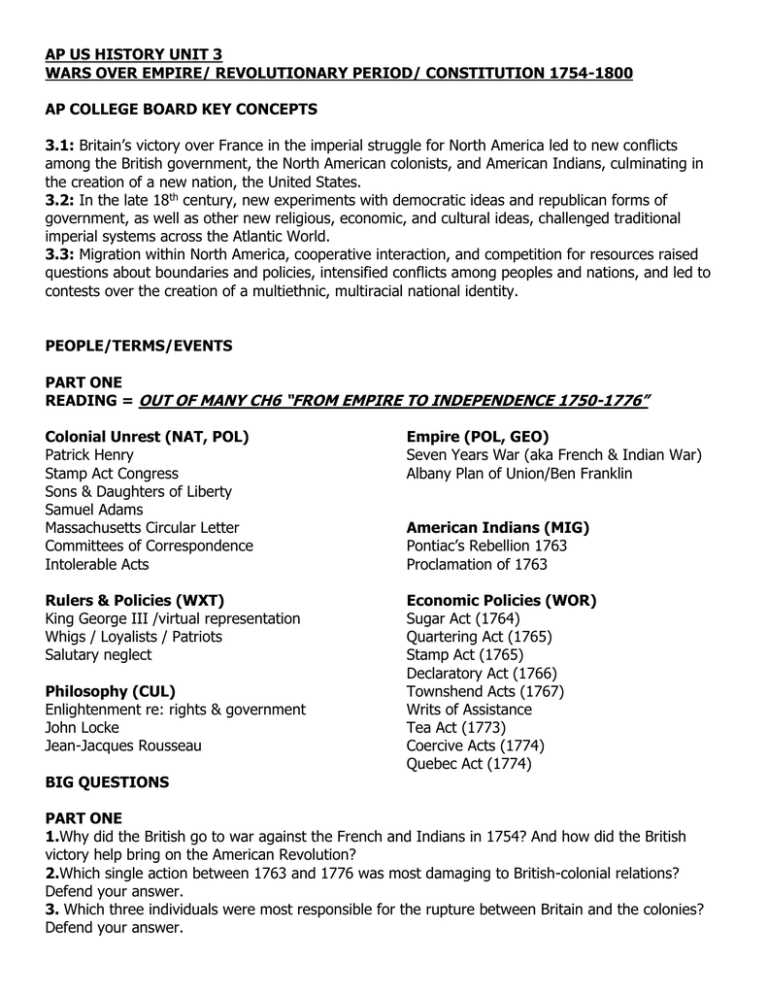
AP US HISTORY UNIT 3 WARS OVER EMPIRE/ REVOLUTIONARY PERIOD/ CONSTITUTION 1754-1800 AP COLLEGE BOARD KEY CONCEPTS 3.1: Britain’s victory over France in the imperial struggle for North America led to new conflicts among the British government, the North American colonists, and American Indians, culminating in the creation of a new nation, the United States. 3.2: In the late 18th century, new experiments with democratic ideas and republican forms of government, as well as other new religious, economic, and cultural ideas, challenged traditional imperial systems across the Atlantic World. 3.3: Migration within North America, cooperative interaction, and competition for resources raised questions about boundaries and policies, intensified conflicts among peoples and nations, and led to contests over the creation of a multiethnic, multiracial national identity. PEOPLE/TERMS/EVENTS PART ONE READING = OUT OF MANY CH6 “FROM EMPIRE TO INDEPENDENCE 1750-1776” Colonial Unrest (NAT, POL) Patrick Henry Stamp Act Congress Sons & Daughters of Liberty Samuel Adams Massachusetts Circular Letter Committees of Correspondence Intolerable Acts Empire (POL, GEO) Seven Years War (aka French & Indian War) Albany Plan of Union/Ben Franklin Rulers & Policies (WXT) King George III /virtual representation Whigs / Loyalists / Patriots Salutary neglect Economic Policies (WOR) Sugar Act (1764) Quartering Act (1765) Stamp Act (1765) Declaratory Act (1766) Townshend Acts (1767) Writs of Assistance Tea Act (1773) Coercive Acts (1774) Quebec Act (1774) Philosophy (CUL) Enlightenment re: rights & government John Locke Jean-Jacques Rousseau American Indians (MIG) Pontiac’s Rebellion 1763 Proclamation of 1763 BIG QUESTIONS PART ONE 1.Why did the British go to war against the French and Indians in 1754? And how did the British victory help bring on the American Revolution? 2.Which single action between 1763 and 1776 was most damaging to British-colonial relations? Defend your answer. 3. Which three individuals were most responsible for the rupture between Britain and the colonies? Defend your answer. PART TWO PEOPLE/TERMS/EVENTS READING = PART TWO OUT OF MANY CH7 “THE AMERICAN REVOLUTION 1776-1786” Separation (NAT) John Adams John Dickinson John Jay 1st Continental Congress (1774) Declaration of Rights & Grievances 2nd Continental Congress (1775) Olive Branch Petition Declaration of the Causes & Necessities for Taking Up Arms Thomas Jefferson Declaration of Independence George Washington Expansion (MIG, POL) Land Ordinance of 1785 Northwest Ordinance of 1787 Final Break (WOR) Prohibitory Act (1775) Treaty of Paris (1783) A New Nation (CUL) Thomas Paine; Common Sense Minutemen Valley Forge Abigail Adams Shays Rebellion War (POL) Paul Revere William Dawes Lexington Concord Battle of Bunker Hill Battle of Saratoga Battle of Yorktown Articles of Confederation Unicameral legislature BIG QUESTIONS PART TWO 1. Chronicle the events of the revolution ending with the Treaty of Paris 1783. 2. Militarily, why did the British fail to win the Revolution? How could one argue that the colonists did not win their independence but rather that the British lost the colonies? 3. Why did France help the colonies? How did this assistance cause problems between the two in 1783? What was the impact on other nations in settling the Revolution in 1783? And What was the impact of the loyalists” exodus on the colonies and Britain? 4. What were the Articles of Confederation? Detail the elements of the articles and what American leaders thought about them. 5. In what ways was the Revolution revolutionary? In what ways was it not?





